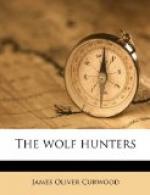“You need not fear about losing your position.” wrote Wabigoon. “We shall make more money up here this winter than you could earn in Detroit in three years. We will hunt wolves. The country is alive with them, and the government gives a bounty of fifteen dollars for every scalp taken. Two winters ago I killed forty and I did not make a business of it at that. I have a tame wolf which we use as a decoy. Don’t bother about a gun or anything like that. We have everything here.”
For several days Mrs. Drew and her son deliberated upon the situation before a reply was sent to the Newsomes. Roderick pleaded, pictured the glorious times they would have, the health that it would give them, and marshaled in a dozen different ways his arguments in favor of accepting the invitation. On the other hand, his mother was filled with doubt. Their finances were alarmingly low, and Rod would be giving up a sure though small income, which was now supporting them comfortably. His future was bright, and that winter would see him promoted to ten dollars a week in the mercantile house where he was employed. In the end they came to an understanding. Mrs. Drew would not go to Wabinosh House, but she would allow Roderick to spend the winter there—and word to this effect was sent off into the wilderness.
Three weeks later came Wabigoon’s reply. On the tenth of October he would meet Rod at Sprucewood, on the Black Sturgeon River. Thence they would travel by canoe up the Sturgeon River to Sturgeon Lake, take portage to Lake Nipigon, and arrive at Wabinosh House before the ice of early winter shut them in. There was little time to lose in making preparations, and the fourth day following the receipt of Wabi’s letter found Rod and his mother waiting for the train which was to whirl the boy into his new life. Not until the eleventh did he arrive at Sprucewood. Wabi was there to meet him, accompanied by an Indian from the Post; and that same afternoon the journey up Black Sturgeon River was begun.
CHAPTER III
RODERICK SEES THE FOOTPRINT
Rod was now plunged for the first time in his life into the heart of the Wilderness. Seated in the bow of the birch-bark canoe which was carrying them up the Sturgeon, with Wabi close behind him, he drank in the wild beauties of the forests and swamps through which they slipped almost as noiselessly as shadows, his heart thumping in joyous excitement, his eyes constantly on the alert for signs of the big game which Wabi told him was on all sides of them. Across his knees, ready for instant use, was Wabi’s repeating rifle. The air was keen with the freshness left by night frosts. At times deep masses of gold and crimson forests shut them in, at others, black forests of spruce came down to the river’s edge; again they would pass silently through great swamps of tamaracks. In this vast desolation there was a mysterious quiet, except for the occasional sounds of wild life. Partridges drummed back in the woods, flocks of ducks got up with a great rush of wings at almost every turn, and once, late in the morning of the first day out, Rod was thrilled by a crashing in the undergrowth scarcely a stone’s throw from the canoe. He could see saplings twisting and bending, and heard Wabi whisper behind him:




